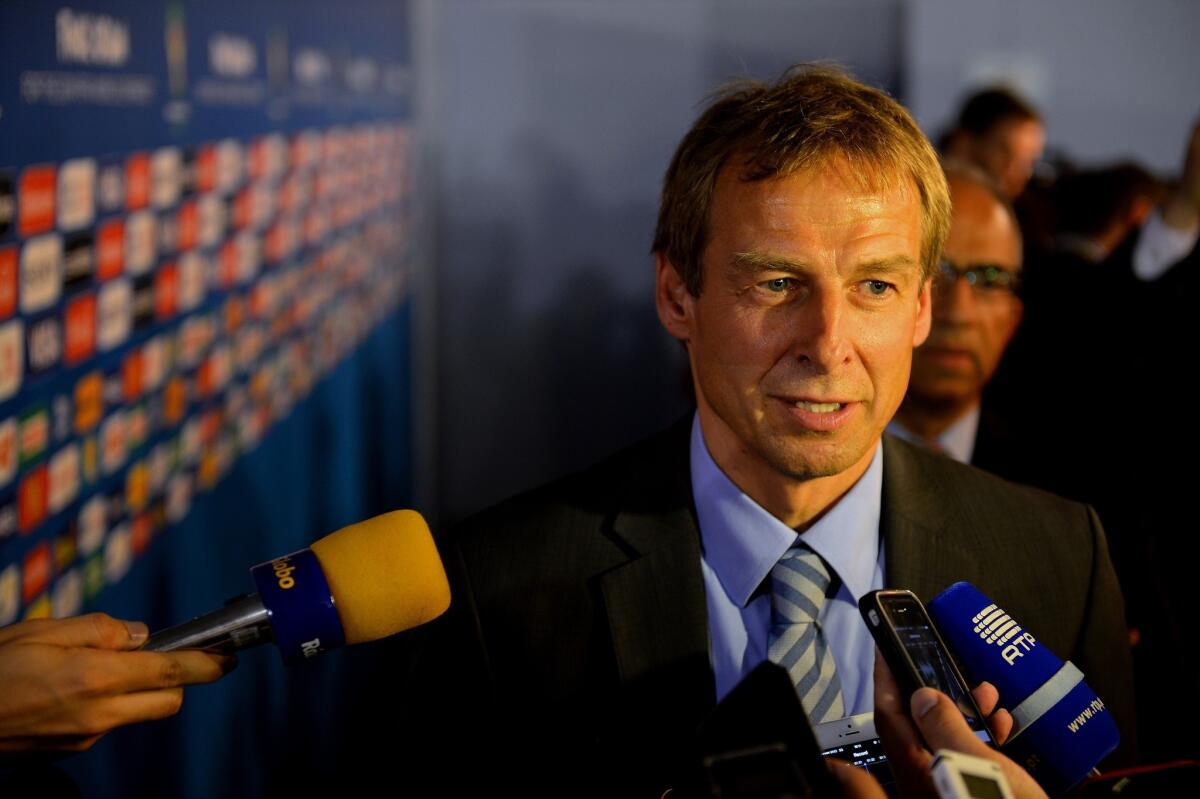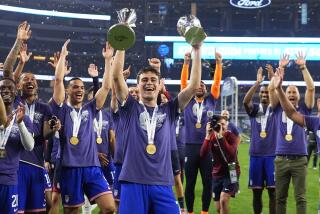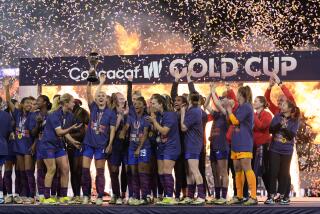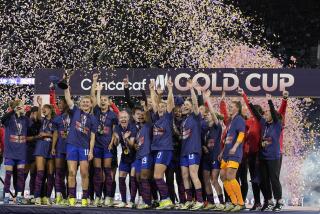Group G looks grueling for U.S. in World Cup

Coach Juergen Klinsmann said he had a gut feeling things would not go well for his U.S. team in Friday’s World Cup draw.
With the field for next summer’s tournament in Brazil the strongest ever, the chances Klinsmann’s team would wind up with tough first-round matchups were high. And when the World Cup pairings were announced at the Brazilian beachfront resort of Costa do Sauipe, that nightmare came true, with the U.S. drawn into a group with three-time champion Germany, Cristiano Ronaldo’s Portugal and Ghana.
Germany is ranked second in the world rankings, three spots ahead of Portugal. And Ghana eliminated the U.S. from the last two World Cups, making this arguably the most difficult first-round pairing the U.S. has ever faced.
“I kind of had in my stomach that we were going to get Germany,” said Klinsmann, who knows that team well, having led the Germans to a World Cup title as a player before coaching them into the tournament semifinals in 2006.
“Obviously, it’s one of the most difficult groups in the whole draw,” he continued. “It couldn’t get any more difficult or any bigger. But that’s what a World Cup is about. It’s a real challenge. We’ll take it on and hopefully we’re going to surprise some people there.”
But though Group G might be the deepest of the eight four-team groups, it’s not the only one featuring difficult and intriguing matchups. Defending champion Spain, which beat the Netherlands in the title game of the 2010 World Cup, will open this one against the Dutch in Group B. Chile, ranked 15th in the world, is also in that group along with Australia.
Group D, meanwhile, features two of the world’s top 10 teams in Uruguay and Italy, along with Costa Rica and England.
The easiest group — if there is one in this 32-team field — might be Group F, made up of Argentina, Iran, Nigeria and Bosnia-Herzegovina.
Mexico, which struggled in qualifying and needed to beat New Zealand in an intercontinental playoff just to reach the World Cup, got a gentle draw, landing in Group A with host Brazil, Croatia and Cameroon.
Each team plays the other three countries in its group during the tournament’s first two weeks, with the top two teams from each group advancing to the knockout round. For the U.S. to move on it probably will need a win and a draw in its first two matches — against Ghana on June 16 in the northeastern city of Natal and against Portugal six days later in Manaus, the Amazon rain forest city where Klinsmann was adamant he didn’t want to play. The Americans will conclude group play with Germany on June 26 in the port city of Recife.
Travel will make the Americans’ path even more difficult. Because the U.S. will be housed in Sao Paulo, it will have to cover more than 9,100 miles during group play. No other World Cup team will travel as far.
The U.S. bused to all four of its matches in 2010 in South Africa and none of the trips were farther than 75 miles.
That travel could also work to the Americans’ advantage, though. The three cities where the U.S. is scheduled to play have average summer temperatures in the mid- to high 80s with high humidity, conditions that could affect both Portugal and Germany.
“I look at it as a huge opportunity,” Klinsmann said from Brazil, in an effort to put a positive spin on the day. “That’s what you want to do. You want to measure yourself with the best in the world, and now we get three huge teams in the group stage.
“It puts us on our toes from the first moment on, once the players come into camp. We know exactly what we are shooting for and what to work on. I see it as a big challenge, but a doable challenge, and our goal is definitely to go to the next round.”
But Klinsmann admitted the final first-round match with Germany will be trying for him, regardless of the group standings. German Coach Joachim Loew was Klinsmann’s assistant in 2006 and many of Loew’s top players — Bastian Schweinsteiger, Miroslav Klose, Philipp Lahm, Lukas Podolski — also played for Klinsmann.
“Obviously, there are lot of emotions involved,” Klinsmann said. “I know the players and therefore it’s going to be a special moment.”
Meanwhile, Mexico and its coach, Miguel Herrera, looked favorably on their first-round pairing. Mexico, Germany and Brazil are the only countries to reach the round of 16 in the last five World Cups, and though Mexico and Brazil are grouped together this summer, both could advance again.
“It’s the best group we could have gotten,” Herrera told a news conference in Mexico City. “The teams are complicated, but the style of the other three lend themselves well to good soccer.
“We have to get a result in the first game to aspire to the second round. It’s great that we can play against teams of this stature.”
Mexico will take on Cameroon in its first game June 13 in Natal before meeting Brazil four days later in Fortaleza. El Tri’s final group-play match will be June 23 against Croatia in Recife.
kevin.baxter@latimes.comTwitter: @kbaxter11







